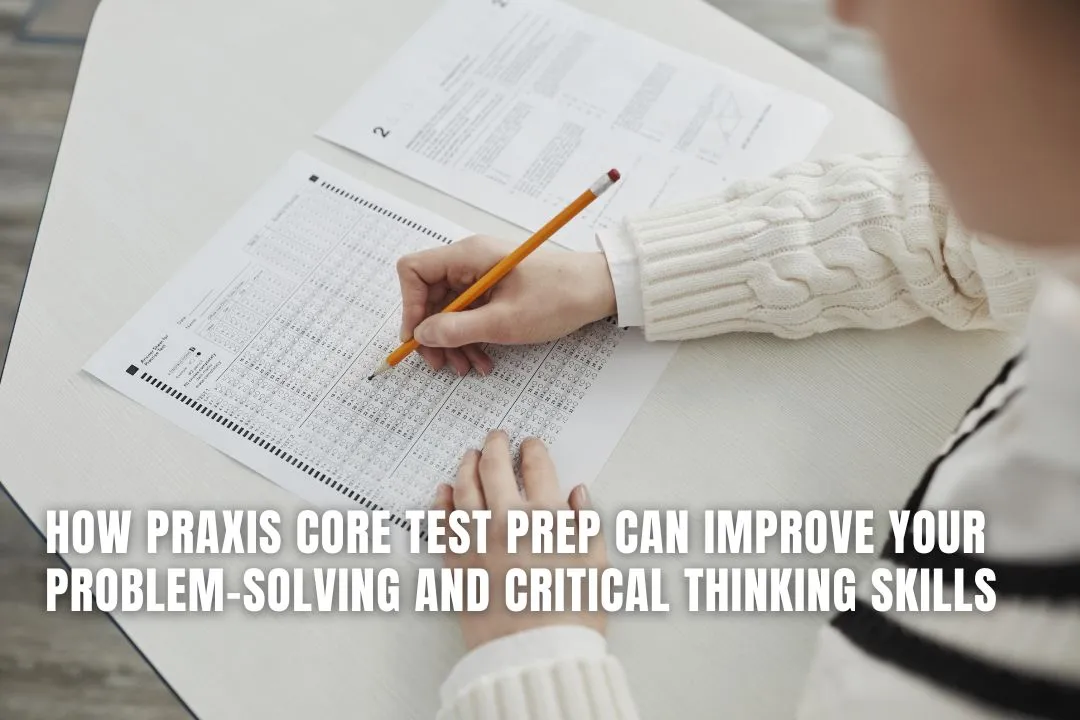
Editorial Disclaimer
This content is published for general information and editorial purposes only. It does not constitute financial, investment, or legal advice, nor should it be relied upon as such. Any mention of companies, platforms, or services does not imply endorsement or recommendation. We are not affiliated with, nor do we accept responsibility for, any third-party entities referenced. Financial markets and company circumstances can change rapidly. Readers should perform their own independent research and seek professional advice before making any financial or investment decisions.
Are you preparing for the Praxis Core test and feeling overwhelmed? Whether you're a future teacher anxious about the maths section or struggling with reading comprehension passages, Praxis preparation can feel like a steep mountain to climb. But here's the good news: the skills you're developing aren't just helping you pass a test—they're building your mental toolkit for life.
Think about it. When you practice breaking down complex word problems or analysing difficult reading passages, you're not just memorising test formats. You're strengthening the same critical thinking muscles you'll use in the classroom and beyond. The strategies that help you eliminate wrong answers on multiple-choice questions are the same ones that will help you evaluate options in real-world situations.
In this article, you'll explore how your Praxis Core test preparation journey can transform your approach to problem-solving and sharpen your critical thinking abilities. Read on for the details!
The Praxis Core exam evaluates the basics of academic skills of future teachers in three main areas: mathematics, writing, and reading. It measures your ability to analyse, interpret, and solve problems within these subjects. Although it may seem like another hurdle to jump before certification, it's a valuable tool for improving your critical thinking and problem-solving skills.
The section requires you to assess written material, evaluate the logic behind arguments, and read between the lines to understand implied meanings. In the Praxis Core writing section, you'll need to clearly express your ideas, organise your thoughts, and support your arguments with solid evidence. Meanwhile, the maths section tests your ability to solve problems and apply key maths concepts to real-world situations, which can be particularly challenging for some test-takers.
The good thing about this is that you can access study materials easily, which can help you prepare effectively for each section. These Praxis Core study tools allow you to break down each section and focus on areas where you need improvement. They provide detailed explanations of the test's format, practice questions, and strategies for answering them, which give you the skills you need to succeed on the actual exam.
Here are a few ways Praxis Core preparation can help build your problem-solving and critical-thinking skills:
The Praxis Core reading section challenges you to analyse different types of texts and extract meaningful insights. This helps develop your ability to assess and interpret information quickly, which is a crucial skill in problem-solving.
As you practice reading comprehension exercises, you'll enhance your ability to identify the key points, weigh different perspectives, and draw logical conclusions from the text. You can apply these analytical skills to real-world problems where data or information needs to be assessed and evaluated critically.
The maths section of the Praxis Core exam focuses on testing your ability to apply logic to solve mathematical problems. Whether it's algebra, geometry, or word problems, you'll have to think logically to figure out the steps to the solution.
Praxis exam preparation helps develop logical reasoning by teaching you to break down complex problems into smaller, more manageable pieces. This ability to deconstruct problems is directly transferable to everyday situations where you need to evaluate a set of circumstances and make an informed decision based on logic and available data.
The writing section of the Praxis Core exam presents an excellent opportunity to develop structured thinking. In this section, you must organise your thoughts and express them clearly in an essay format.
This process involves breaking down complex ideas, organising your arguments, and presenting them logically and coherently. As you practice, you'll learn to think more structurally, which allows you to tackle problems with a straightforward, step-by-step approach instead of feeling overwhelmed by their complexity.
In the maths section of the Praxis Core, you'll be asked to interpret data from tables, graphs, and charts. This practice is crucial for developing data interpretation skills, which are increasingly important in a data-driven world.
Evaluating numerical data and extracting meaningful insights is a powerful problem-solving tool. Whether reviewing financial reports, analysing test results, or interpreting a colleague's presentation, interpreting data accurately will strengthen your problem-solving abilities and make you a more informed decision-maker.
Another skill developed through the Praxis Core prep books is thinking critically and evaluating arguments based on evidence. The reading and writing sections require you to assess claims, find evidence to support or challenge those claims, and form your own reasoned conclusions.
This evidence-based analysis is an essential component of critical thinking. Whether you're dealing with a problem in the classroom or evaluating an argument in the workplace, the ability to base your conclusions on evidence will help you make better decisions and approach issues with greater clarity.
Preparing for the Praxis Core test is about more than passing an exam—it's an opportunity to sharpen essential skills that will serve you throughout your teaching career and beyond. As you work through reading comprehension passages, tackle maths problems, and craft well-structured essays, you're not just studying for an exam; you're training your mind to think critically, solve problems efficiently, and approach challenges with confidence. So, the next time you feel frustrated by a harder test question or overwhelmed by the Praxis Core study process, take a moment to appreciate how these challenges are shaping you into a more thoughtful, analytical, and practical educator.